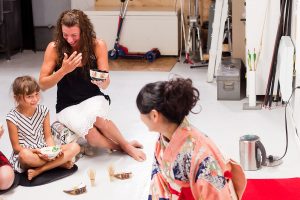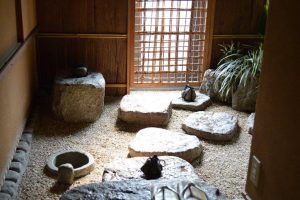(English text will follow)
« Cha-no-yu », qui signifie « la Voie du Thé », est une cérémonie du thé japonaise dans laquelle un hôte ou une hôtesse sert un bol de matcha à ses invités. Mais c’est bien plus qu’un thé avec des amis.
Reina a commencé à étudier la cérémonie du thé à l’âge de 14 ans avec sa grand-mère, qui enseignait la cérémonie du thé à l’époque. Elle a commencé à pratiquer les bases de la cérémonie du thé et participait à des cérémonies du thé annuelles avec sa mère.
Puisque la cérémonie du thé a une forte influence sur les arts japonais tels l’architecture, la composition florale, la poésie, la céramique, la laque, la peinture, la calligraphie, la conception de jardin, le kaiseki et la confiserie traditionnelle, l’hôte ou l’hôtesse doit bien connaître tous ces domaines pour offrir une cérémonie du thé qui est empreinte de sens.
Chaque détail doit être planifié avec soin. Le thème de la cérémonie est choisi en fonction des invités et de la saison. Il faut servir le bon type de confiseries ou de mets, choisir des bols de la bonne forme et sélectionner les outils de préparation du thé appropriés. Toutes ces choses doivent être assorties au rouleau de parchemin accroché au mur et à la composition florale dans la salle de thé.
Reina a continué à pratiquer la cérémonie du thé après son arrivée à Montréal. Après 20 ans en tant que praticienne de la cérémonie du thé, elle est encore plus consciente de la manière dont la cérémonie cha-no-yu exprime la culture et les croyances japonaises, surtout à l’extérieur du Japon.
Certains importants principes Zen de la cérémonie du thé s’appliquent dans notre vie quotidienne. L’un deux est omotenashi, l’hospitalité japonaise. En Occident, on entend souvent par hospitalité le fait d’offrir un service à la clientèle exceptionnel tout en s’attendant à quelque chose en retour. Omotenashi est une philosophie de service à la clientèle exceptionnel et désintéressé. Ça veut dire que l’hôte ou l’hôtesse d’une cérémonie du thé accueille les invités et leur prépare un bol de thé en y mettant tout son cœur et sans attendre quoi que ce soit en contrepartie.
Un autre important concept Zen est ichigo-ichie, un proverbe japonais qui signifie « une rencontre, une occasion ». Nous croyons que chaque cérémonie du thé ou rencontre dans la vie est une occasion unique et qu’il faut en apprécier chaque instant.
« Pour moi, la cérémonie du thé est une façon de méditer, de rester concentrée, d’échanger avec les gens et d’apprécier leur présence. Ces concepts sont depuis longtemps très importants dans notre quotidien et nous les avons transmis de génération en génération, et maintenant, j’ai l’occasion de les partager au Canada », dit Reina.
La cérémonie du thé japonaise n’est pas qu’une manière traditionnelle de célébrer délicatement la tranquillité et l’harmonie. C’est un espace rempli d’art japonais où les gens peuvent se déconnecter du chahut de la société, échanger avec les autres et trouver la paix intérieure.
S’il vous intéressé à participer à une cérémonie du thé, voici notre prochain événement samedi, 5 décembre à Montréal!
***********************************************************************************************************
“Cha-no-yu,” which means “The Way of Tea,” is a Japanese tea ceremony in which a host or hostess serves a bowl of matcha to guests. But it is much more than a simple tea gathering with friends.
Reina started studying tea ceremony when she was 14 years old with her grandmother, who was then a tea ceremony teacher. She started practising basic tea ceremony and participating in annual tea ceremonies with her mother.
Since tea ceremony has a strong influence on Japanese arts like architecture, flower arrangement, poetry, ceramics, lacquerware, painting, calligraphy, garden design, kaiseki and traditional confectionery, the host or hostess must be familiar with all of these things in order to host a meaningful tea ceremony.
Every detail is carefully planned out. The theme is chosen based on the guests and the season. The host or hostess must serve the appropriate food or sweets, the tea vessels must be the right shape and the correct tea-making tools must be selected. All of these items must match both the scroll hanging on the wall and the flower arrangement in the tea room.
Reina continued practising tea ceremony after arriving in Montreal. After 20 years as a tea ceremony practitioner, she is even more aware of how much cha-no-yu embodies Japanese culture and beliefs, especially outside of Japan.
Some of the important Zen principles in tea ceremony are applied in our daily life. One of them is omotenashi, Japanese hospitality. In the West, hospitality tends to mean providing exceptional customer service with the expectation of receiving something in return. Omotenashi is about providing exceptional customer service with no assumption of receiving a reward. In tea ceremony, this means that the host or hostess welcomes the guests and prepares a bowl of matcha from their heart without expecting anything in return.
Another important Zen concept is ichigo-ichie, a Japanese proverb that translates to “one encounter, one opportunity.” We believe that every tea ceremony or encounter in life is a once-in-a-lifetime chance and that we should appreciate every moment of it.
“For me, tea ceremony is a way to meditate, to stay focused, to connect with other people and appreciate their presence. We have long treasured these important concepts in everyday life and passed them down from generation to generation, and now I get to share them in Canada,” says Reina.
Japanese tea ceremony is not just a delicate traditional celebration of tranquility and harmony. It is a space filled with Japanese arts where people can disconnect from the bustle of society and connect not only with others but also with their inner peace.
If you are interested in partifipating in a tea ceremony, here is our next event on Saturday, December 5 in Montreal!








